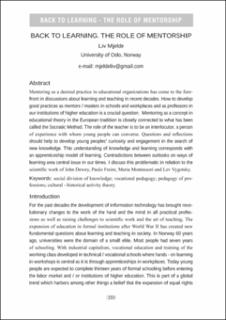| dc.contributor.author | Mjelde, Liv | |
| dc.date.accessioned | 2021-09-20T08:00:27Z | |
| dc.date.available | 2021-09-20T08:00:27Z | |
| dc.date.created | 2021-04-22T12:01:03Z | |
| dc.date.issued | 2020 | |
| dc.identifier.isbn | 9789608351837 | |
| dc.identifier.uri | https://hdl.handle.net/11250/2779079 | |
| dc.description.abstract | Mentoring as a desired practice in educational organizations has come to the forefront in discussions about learning and teaching in recent decades. How to develop good practices as mentors / masters in schools and workplaces and as professors in our institutions of higher education is a crucial question. Mentoring as a concept in educational theory in the European tradition is closely connected to what has been called the Socratic Method. The role of the teacher is to be an interlocutor, a person of experience with whom young people can converse. Questions and reflections should help to develop young peoples’ curiosity and engagement in the search of new knowledge. This understanding of knowledge and learning corresponds with an apprenticeship model of learning. Contradictions between outlooks on ways of learning area central issue in our times. I discuss this problematic in relation to the scientific work of John Dewey, Paulo Freire, Maria Montessori and Lev Vygotsky. | en_US |
| dc.language.iso | eng | en_US |
| dc.publisher | Society for the Propagation of Useful Books | en_US |
| dc.relation.ispartof | The Capital of of Knowledge: proceedings of the First International Congress | |
| dc.relation.uri | https://europemeriti.org/index.php/en/events | |
| dc.subject | Social knowledge divisions | en_US |
| dc.subject | Vocational pedagogy | en_US |
| dc.subject | Profession pedagogy | en_US |
| dc.subject | Cultural - historical activity theories | en_US |
| dc.title | Back to learning: the role of mentorship | en_US |
| dc.type | Conference object | en_US |
| dc.description.version | publishedVersion | en_US |
| cristin.ispublished | true | |
| cristin.fulltext | original | |
| dc.identifier.cristin | 1905832 | |
| dc.source.pagenumber | 233-239 | en_US |
